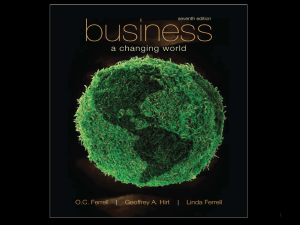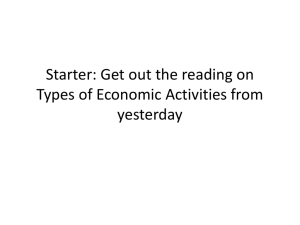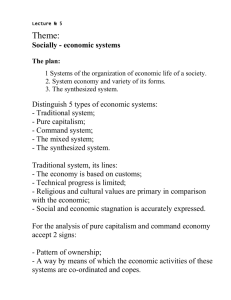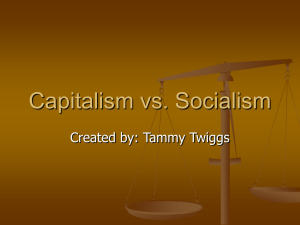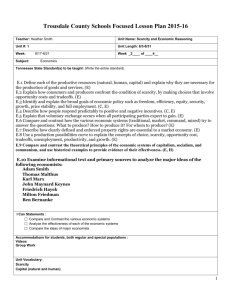File - Mrs. Nelson Economics
advertisement
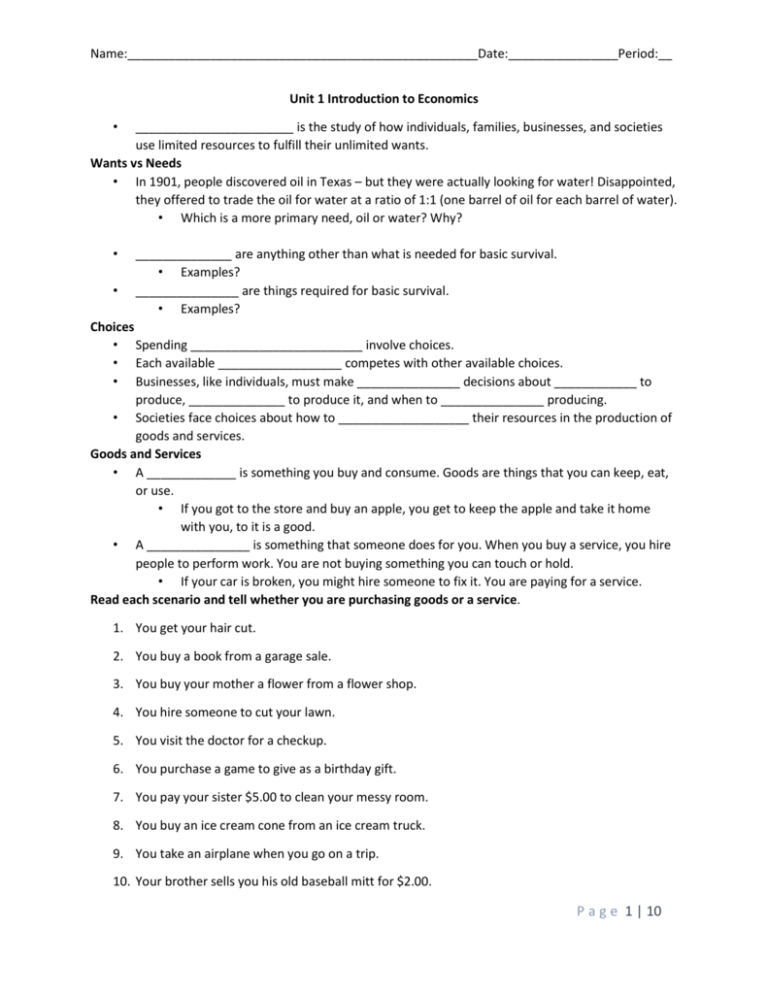
Name:___________________________________________________Date:________________Period:__ Unit 1 Introduction to Economics • _______________________ is the study of how individuals, families, businesses, and societies use limited resources to fulfill their unlimited wants. Wants vs Needs • In 1901, people discovered oil in Texas – but they were actually looking for water! Disappointed, they offered to trade the oil for water at a ratio of 1:1 (one barrel of oil for each barrel of water). • Which is a more primary need, oil or water? Why? • • ______________ are anything other than what is needed for basic survival. • Examples? _______________ are things required for basic survival. • Examples? Choices • Spending _________________________ involve choices. • Each available __________________ competes with other available choices. • Businesses, like individuals, must make _______________ decisions about ____________ to produce, ______________ to produce it, and when to _______________ producing. • Societies face choices about how to ___________________ their resources in the production of goods and services. Goods and Services • A _____________ is something you buy and consume. Goods are things that you can keep, eat, or use. • If you got to the store and buy an apple, you get to keep the apple and take it home with you, to it is a good. • A _______________ is something that someone does for you. When you buy a service, you hire people to perform work. You are not buying something you can touch or hold. • If your car is broken, you might hire someone to fix it. You are paying for a service. Read each scenario and tell whether you are purchasing goods or a service. 1. You get your hair cut. 2. You buy a book from a garage sale. 3. You buy your mother a flower from a flower shop. 4. You hire someone to cut your lawn. 5. You visit the doctor for a checkup. 6. You purchase a game to give as a birthday gift. 7. You pay your sister $5.00 to clean your messy room. 8. You buy an ice cream cone from an ice cream truck. 9. You take an airplane when you go on a trip. 10. Your brother sells you his old baseball mitt for $2.00. P a g e 1 | 10 Name:___________________________________________________Date:________________Period:__ The Problem of Scarcity • ____________ resources are _____________________. • People _________________ for limited resources. • _____________________ exists because people cannot satisfy their every want. • Unlike scarcity, _________________________ are temporary. Water competition is growing, how are companies learning to cope? Factors of Production • Land – • Labor – • Capital – • Entrepreneurship – • Scarcity forces people to make ________________about how they will use their resources. • The _______________ of these choices may be long-lasting. • During the 1600s, the demand for Holland’s tulips became so great that prices rose to unbelievable levels. In fact, around 1610, a single tulip bulb could be given as the dowry for a bride. • What do you think the groom might have had to give up in order to offer a tulip bulb in 1610? • What do you think the trade-off would be today? Trade-Offs • When making __________________________, limited resources force individuals, businesses, and nations to make ___________________. • Trade-offs result in _____________________ something of value to get what is most wanted. P a g e 2 | 10 Name:___________________________________________________Date:________________Period:__ • • • • • • When people make ______________________________, they _________________ one good or service for another. In making a purchase, the good they are exchanging is_________________. Exchanging one thing to get the use of another is called a ___________________. You make trade-offs every time you use a ___________________ in one way instead of another. The result of a trade-off is what you __________________ in order to get or do ___________________________. Sometimes the choice can involve the _____________________________, for example, choosing to volunteer at an animal shelter instead of going with friends to the local mall. At other times, the choice may _____________________________-buy the newest Playstation Game or save for a cell phone? Opportunity Costs • Every time an economic decision is made, there is the risk of not selecting the best __________. • The __________________________________ of a decision is what is given up when the alternative choice is not selected. • For example, the opportunity cost of deciding to ______________________________ studying for a math test is the lost opportunity to spend time with friends. • The risk is whether the _________________________ studying will result in a higher test score. • For example, time is a ________________ resource. There are a ________________________ of hours in a day and you must choose how to use them. • If you use one-hour of study a school assignment, the _______________________ are all the other things you could have done during that hour. • The ___________________________ is what you would have done for that hour had you chosen not to study. • In other words, it is the _________________________ that you have up in order to study. • Knowing about the _______________________ and _______________________ can help you make decisions at all levels. You will be able to make wiser use of your resources if you are aware of the _________________ and ________________________________ of your decisions. • Businesses must also consider these factors when they make _______________ about investing money or producing _________________________ rather than another. What is Economics is Really About Activity P a g e 3 | 10 Name:___________________________________________________Date:________________Period:__ Production Possibilities Curve • • The production possibilities curve shows the ___________________ combination of goods and services that can be ____________________ from a given amount of resources. Using a production possibilities curve, a __________________ can decide how to use resources. Identify what will happen to the PPC for consumer goods and capital goods. Consumer Goods 1. What would happen if we had faster computers and better technology? Capital Goods Consumer Goods 2. What if a country’s power plants were destroyed and the amount of the electricity they produce decreased? Capital Goods Consumer Goods 3. What if there was an increase in unemployment which causes recession in the economy? Capital Goods Consumer Goods 4. What if there was an increase in education? P a g e 4 | 10 Name:___________________________________________________Date:________________Period:__ Capital Goods Three Basic Economic Questions 1. ____________ goods and services _______________be produced? • If more of one particular________is produced, then less of something else will produced. 2. __________ should they be produced? • Decisions must be made as to what the best ________________________ of available inputs will be to get the job done for the _________________ possible cost. 3. For ____________ should it be produced? • The type of _________________________________ under which people live determines how the goods and services will be ________________________among its members. Economic Systems • The way a nation uses its resources to ____________________ its people’s needs and wants is called an economic system. Traditional Economy • The traditional economy system makes decisions based on ________________ and ____________that have been handed ___________ from generation to generation. • Advantages: • You know what is ______________________ of you. • Family and community ties are ___________________. • Disadvantages: • _________________ is discouraged and perhaps punished. • Methods of _____________________ are often inefficient. • Choices________________ consumer goods are rare. • Individuals rarely experience an _______________________level of material well-being. Command Economy • In a command economy (___________________________) system, government leaders control the ________________ of production and make ___________decisions about their use. • Disadvantages: • Lack of____________________ to work hard or show inventiveness. • Lack of ____________________ choices. Market Economy • In a market economy (__________________________) system, individuals _________the factors of production and make economic choices based on _________________________ while looking out for their own and their families’ best interests. • Advantages: • People have__________________________. • ___________________________ provides consumers with a wide array of goods and services to choose. • There is an __________________________ system of determining costs. • Disadvantages: • Lack of __________________ about those too young, too old, or too sick to work. P a g e 5 | 10 Name:___________________________________________________Date:________________Period:__ Circular Flow • The flow of _______________, goods and services, and income in a ______________ system is a circular flow of income and output. Mixed Economy • A mixed economy system _____________________ characteristics more than one type of economy. • ______________countries have a mixed economy in which ___________________ ownership of property and individual decision making are ______________________ with government intervention and regulations. • A mixed economy is a combination of _________________ and _________________economies. Limited Role of Government • ___________________________ is another name for the market economy system. • Pure capitalism has been called _________________________ system; a French term meaning “let (people) do (as they choose).” • Laissez-faire is an economic system in which the government minimizes its interference with the economy. Also known as “______________________” government. • Capitalism in the __________________________ is best defined as an economic system in which_____________________ individuals own the factors of production but ________them within certain legislated limits. P a g e 6 | 10 Name:___________________________________________________Date:________________Period:__ Other Characteristics • The American economy is known as a _______________________________________. Individuals are __________ to own the factors of production and _______________ how to use them within____________ limits; same as capitalism. • Americans also have freedom of ________________ where buyers, _________sellers, make the decisions about what ______________ be produced. • At times, the government has _______________________ in various areas of the economy to _________________ buyers and ________________________ price. • The goal of a business is to make a _________________. • The desire to make a profit is referred to as _____________________________ or profit motive. • The risk of ____________, when profits are not realized, is also_________ of the free-enterprise system. • In a free-enterprise system, the ___________ of profits encourages ______________________. • For competition to exist, ________________ barriers to enter into, and exit from must be________. • Competition leads to an_________________ use of resources since businesses are ________________to keep costs of production as low as possible. • One of the most important characteristics of capitalism is the existence of _________________. Goals of Free Enterprise • Economic goals of Americans: • ________________– to allow each member of society to make choices. • ________________ – wise use of limited resources. • ________________– economic system should be fair and just. • ________________ – want protection against risks beyond our control. • ________________ – attempt to reduce extreme ups and downs in the standard of living. • ________________– increased production of goods and services over time. Rights and Responsibilities • The American _______________________________ system bestows numerous economic rights and protections on us, but we must take on certain ____________________________ (such as supporting ourselves and our family). • We must also become ______________________________ about government policies and elect responsible government officials. P a g e 7 | 10 Name:___________________________________________________Date:________________Period:__ Pure Socialism • Pure command socialism is an economic system in which there is ____________ private property and the government __________ the factors of production and attempts to manage output and the distribution of__________________. Characteristics of Pure Socialism 1. Most _____________ are set by the state, rather than by forces of _______________ and demand. 2. The movement of __________________, particularly ____________, is strictly controlled. The _____________ planning authority makes all decisions. 3. Most of the major _____________ of production are owned by the state. Private ________________ rights are strictly limited to small tools that an ________________________ needs for an occupation. 4. ________________________ risk taking is not allowed. The state takes all of the ____ when it decides which _______ companies shall be formed. All citizens ____ for unsuccessful risk taking. 5. Economic decisions about what. ________, and for whom to produce are all made by _____ officials through central planning agencies and other ___________________ units. 6. Taxation is ___________ used to redistribute income. Karl Marx viewed history as a continual ________________ between capitalists (owners of land, machines, and factories) and the workers. He believed that the capitalists ___________________ the workers. He outlined the eventual __________________ of capitalism and predicted the evolution of socialism into communism, an idealized _______________in which no government is necessary. The Change from Capitalism to Socialism According to Marx 1. Capitalism would suffer extreme _____________________ and depressions that would __________ workers. A _____ rich capitalists would have all industrial power. 2. The ________ gap between the rich and the poor would cause workers to _________ and overthrow capitalism. 3. The victorious ________________ would establish a new socialist system. Workers, through the ________, would own and control the means of ________________________. P a g e 8 | 10 Name:___________________________________________________Date:________________Period:__ 4. The system would _____________ into pure communism. Workers would contribute to society to their _______ abilities and, in return, take only what they needed. In the twentieth century, socialism split into two major trends: Democratic socialism: system that works within the _______________________________ framework of a nation to elect socialists to office; the _________________________ usually controls only some areas of the economy. Authoritarian socialism: system that supports _____________________ as a means to overthrow capitalism and bring about socialist goals; the _______________ economy is controlled by a central government; also called ___________________________________. The Benefits of Capitalism • Supporters of capitalism: – Those who place a high value on ___________________ freedom, initiative, and individuality. – Demonstrate that ____________________ allows for more efficiency in the marketplace and for greater ________________ of economic growth. Planning in Market and Command Economies Market System: Decentralized In the U.S. market system, ________________ is undertaken by private firms, individuals, and elected government representatives. Economic activity is coordinated by __________________ businesses and individuals responding to market signals. • Command System: Centralized In pure socialist systems, central planners undertake the planning on ________________ of everyone. Planners also ___________________ the movement of resources, particularly labor. The United States has an economy planned by ______________________ firms, individuals, and elected government officials, while socialism has an economy planned by ______________________planners. Problems of capitalism: – Income is __________________________ distributed throughout the economy. – There are ___________enough schools and museums for the general public. All economic systems answer three basic questions: P a g e 9 | 10 Name:___________________________________________________Date:________________Period:__ There are four basic types of economic systems: P a g e 10 | 10





